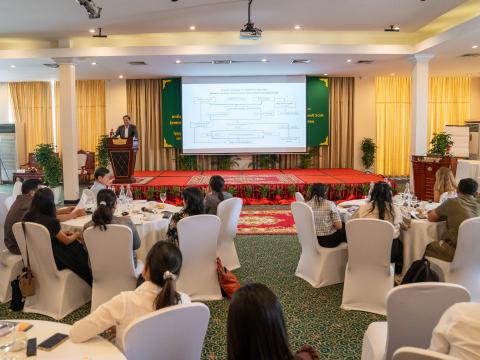New Report Reveals Improvements and Gaps in Rural Families’ Access to Water

Cambodia’s water and sanitation sector experienced outstanding progress in the past decades. However, rural areas, where most of the population resides, still face significant challenges in accessing clean water. A new report from World Vision International suggests that Cambodia needs a ten-fold increase in efforts to connect all rural households to piped water by 2030, and thus achieve the sustainable development goal 6.1.
World Vision International in Cambodia (WVI-C) commissioned an independent evaluation to understand the impact of its programmes on rural communities’ access to piped water. The key findings were shared on Friday 20th of September during a national workshop, in the presence of H.E Noun Daniel, Secretary of State-Ministry of Rural Development and government officials from the Council of Agriculture and Rural Development (CARD) and Provincial Department of Rural Development (PDRD), private sector and development partners working to improve water access in Cambodia.
The report highlights significant advancements in expanding access to piped water for rural communities across Cambodia. Since 2015, World Vision supported the construction and management of 125 community small-scale piped water distribution systems, connecting 329 villages and benefiting 137,000 new people from 27,503 households with access to piped water.
Key Findings of the community piped-water stations evaluation include:
- Strong Effectiveness and Sustainability: 97% of the 125 community small-scale piped water distribution systems supported by WVI-C are functioning effectively. These systems have proven to be more reliable than the national average, showcasing their robustness and sustainability.
- Social and Economic Benefits: Access to piped water has led to improved health outcomes, reduced waterborne diseases, and enhanced sanitation and hygiene practices. This has also alleviated the burden on women and children, providing better opportunities for education and income generation.
- Inclusivity and Equity: Efforts to ensure equitable access have significantly benefited low-income and vulnerable households. Notably, 31% of the connections serve poor and marginalised households, with many receiving initial connections at reduced or no cost.
- Community Ownership and Employment: Active community involvement in planning, implementation, and management has fostered local ownership and accountability. Transparent tariff-setting and community-driven financing have further enhanced the sustainability of these systems.
“Access to clean water is a fundamental human right and a cornerstone of sustainable development. The progress made by WVI-C is commendable and aligns with the Royal Government of Cambodia’s sustainable goals for water and sanitation. The Ministry of Rural Development partners with thedevelopment partners and NGOs to continue to invest and support these initiatives to ensure that every Cambodian, especially those in rural areas, has access to safe and reliable water sources," emphasized His Excellency Srin Poutthy, Director of the Rural Water Supply Department.
Janes Imanuel Ginting, National Director for World Vision highlighted the success of community piped water systems, emphasizing the power of collaboration. "Equitable access to clean water improves health and empowers women and children with greater opportunities for education and economic growth. We remain committed to reaching Cambodia's most vulnerable communities," he stated.
Mr. Suy Yet, Water Management Committee Leader in Preah Netr Preah district, emphasized how community involvement in managing piped water systems has fostered ownership and sustainability. He noted that access to clean water has improved health and empowered residents, particularly vulnerable families and children, to secure a better future. The community remains committed to ensuring reliable access to safe drinking water for all households and schools.
Despite notable successes, challenges persist, including financial limitations, weak social accountability, and insufficient long-term planning. WVI-C recommends increased investment through public-private partnerships to expand piped water infrastructure, a review of licensing regulations to reduce overlaps and encourage community-driven investments, and the implementation of transparent accountability frameworks to build trust and strengthen local public investment.
WVI-C emphasizes the importance of a collaborative approach among policymakers, donors, development partners, NGOs, and the private sector to expand access to piped water. Achieving this goal requires unified efforts to ensure that all communities, especially the most vulnerable, can access clean and safe drinking water. By working together, we can improve health outcomes, strengthen economic stability, and enhance overall well-being for individuals and families across the country.
About WVI-C WASH Programme
World Vision's Water Sanitation and Hygiene programme in Cambodia, launched in 2007, and is part of our integrated nutrition approach to achieve sustainable well-being for 5 million girls and boys in Cambodia. During the last 5 years, over 1.7 million people in rural areas have gained access to WASH facilities, including clean water and improved sanitation. World Vision’s support underscores our commitment to ensuring everyone has access to clean and safe water.